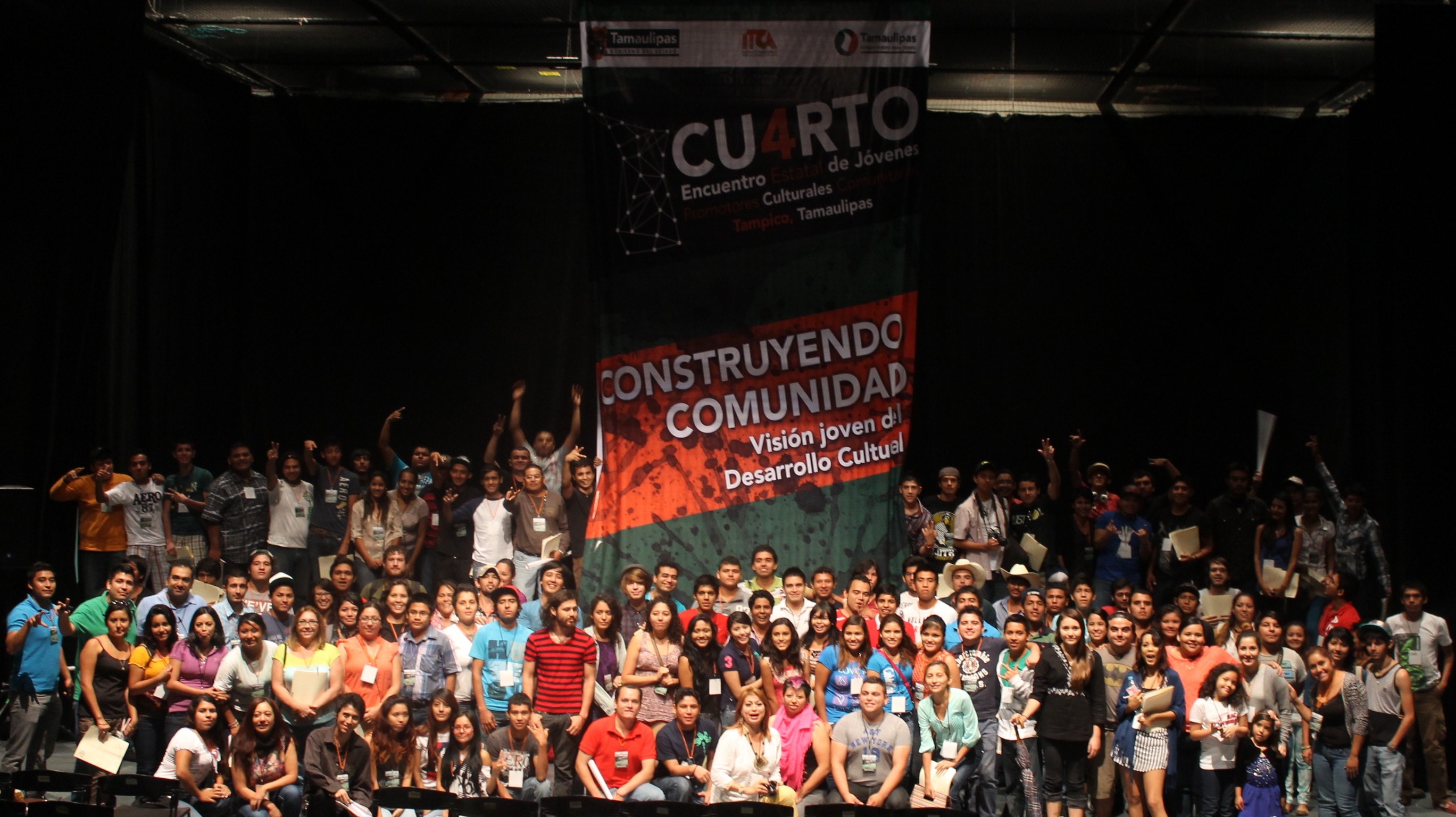Network of community culture groups: youth from Tamaulipas
1. Context
Tamaulipas is one of the 32 states of Mexico. It borders with Nuevo León in the west, Veracruz and San Luis Potosí in the south, the Gulf of Mexico in the east, and the United States of America in the north. It is the sixth largest state in the country, comprising 43 municipalities, and boasts a broad cultural richness of its own, including the contribution of the migrant populations living on the border. In 2008, violence notably increased in Mexico, with youths as both victims and aggressors. In Tamaulipas, violence escalated in 2010 with over 1,209 murders, the highest figure since 2006, and an increase of over 1,200% in comparison to the three previous years. Faced with this situation, it was necessary to rethink public policies on cultural projects that would contribute to peace, social cohesion and the participation of youths as social actors.
The main characteristic of the project is the training of youths as community cultural promoters, to work as volunteers to invigorate and contribute to the coexistence of their communities.
2. Goals and challenges
The project aims to train youths as promoters of cultural diversity, to participate actively as actors and links between governments and citizens in the construction of environments of peace and the generation of coexistence, transforming and invigorating the communities while contributing to the exercise of cultural rights and local development through culture and creativity.
Between 2007 and 2011, over 40,000 murders were committed in Mexico. Chihuahua, Nuevo León and Tamaulipas accounted for half of them. In 2010, the state was considered the third most violent in the country and youths were responsible for half the murders. An initiative was launched to offer alternative kinds of participation to youths to help construct environments of peace and social cohesion. The initiative was promoted by the state government through the project “Red de Colectivos Culturales Comunitarios: Jóvenes de Tamaulipas” (Network of Community Cultural Groups: Youths of Tamaulipas”, which was constituted in 2011 with the participation of seven groups from eight municipalities. It is planned to extend the network in the future to the 43 municipalities that make up the state (34 to date) and special emphasis was placed on the need for ongoing monitoring of the processes with major investment, as well as the training, capacity-building and rotation dynamics of its members.
The project has had a real impact on local cultural policies, governance, diversity, creativity, participatory democracy and sustainable development.
3. Development and methodology
The main characteristic of the project is the training of youths as community cultural promoters, to work as volunteers to invigorate and contribute to the coexistence of their communities, as well as the decentralisation of cultural work to enhance democratic participation.
Based on this cultural promotion approach, it is possible to initiate processes in the communities targeted at, contributing to local development through culture. The project was developed with the following methodology:
a) Training workshop aimed at young community cultural promoters in the seven most important municipalities;
b) Creation of the Network CCC;
c) Meeting of community cultural promoters from the Network;
d) Creation of the Planning Council of the Network;
e) Process of capacity-building for cultural promoters;
f) Support for projects from the Network;
g) Extension of the Network to 34 municipalities, including rural communities;
h) Creation of Community Arts Centres. From 2011 to 2014, over 650 youths qualified and service was provided to over 40,000.
Moreover, over 600 socio-cultural actions were developed in the communities, including art workshops, cultural and ecological initiatives, community festivals and concerts, art presentations, reading of stories, open air libraries, community exhibitions, creation of collective mural paintings, cinema festivals, open air screenings, art interventions and capacity-building courses, lectures and certification. To date there are 34 groups in 34 municipalities from the 6 regions that form the state, with 549 members.
The main actors are the youths that make up the Network CCC and the communities, and have the support of the Instituto Tamaulipeco para la Cultura y las Artes (ITCA) and local governments. The state government has encouraged a public policy that prioritises youths and communities, participatory democracy and the exercise of cultural rights. To this end, it supports the training and capacity-building of young community cultural promoters whose leadership and vision has managed to invigorate the six regions of Tamaulipas, thereby generating a significant power of cohesion and social transformation. In 2012, the project benefited from the EU Subsidy Funds, providing it with a subsidy to expand and strengthen its work during 2012 and most of 2013.
The project has had a real impact on local cultural policies, governance, diversity, creativity, participatory democracy and sustainable development. There are over 650 qualified youths, 34 groups and two Community Arts Centres in 34 municipalities of the six regions that make up the state, forming part of a state network with 549 volunteers who have developed 600 socio-cultural actions in communities, providing service to over 40,000 people.
If it were possible to start the project again, more emphasis would be placed on the training and capacity-building methodology and contents, the structure of the Network CCC and the monitoring of the process.
4. Other information
Social networks: Red Colectivos Culturales Comunitarios
This article has been written by Libertad GARCÍA CABRIALES, director general of the Institute for Culture and Arts of Tamaulipas.
Contact: itca(a)tamaulipas.gob.mx
